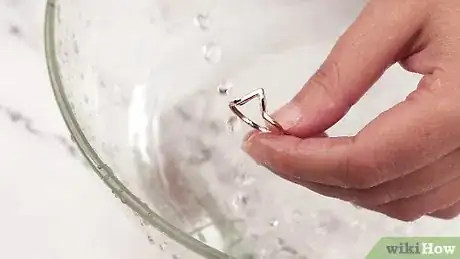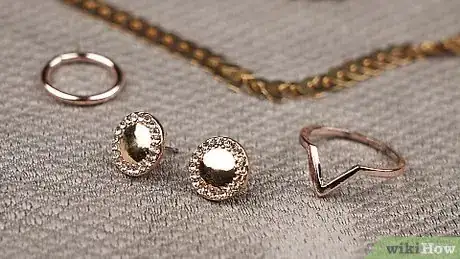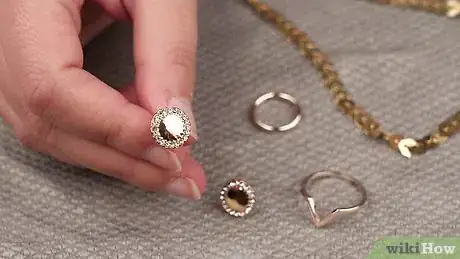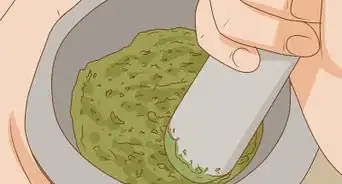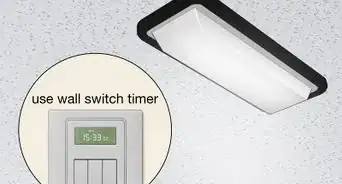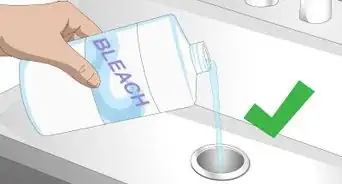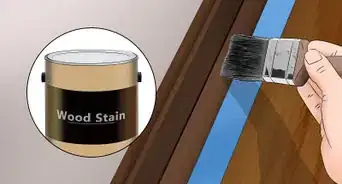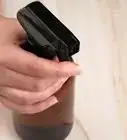This article was co-authored by Edward Lewand. Edward Lewand is a Graduate Gemologist & Accredited Appraiser with over 36 years of experience in the jewelry industry. He completed his residency in graduate gemology at the G.I.A. in 1979, New York and now specializes in Fine, Antique and Estate Jewelry, consultations and expert witness work. He is a Certified Appraiser of the Appraiser Association of America (AAA) and an Accredited Senior Appraiser (ASA) of the American Society of Appraisers In Gems and Jewelry.
This article has been viewed 44,433 times.
The glowing beauty of gold makes it one of the most desired metals in the world. While gold doesn’t tarnish very easily, it can be daunting to clean when it does. Gold is soft, easily scratched, and valuable. However, with some care, attention, and the proper cleaning methods, your gold’s beauty will last for generations.
Steps
Using Mild Dish Soap
-
1Use dish soap to clean delicate jewelry. This method is the gentlest way to clean gold. If the gold is a very soft 18- or 24-karat gold, it may be scratched by other methods. However, the cleaning agents in the dish soap may loosen gemstones, diamonds, and other set stones.
- If you think a stone may be coming loose on your jewelry, take it to a jeweler to be reset. Otherwise it may fall out and get lost.
-
2Create the cleaning agent. Pour about a tablespoon of dish soap into a dry glass bowl.[1] Adding the soap before the water will help the dish soap mix in evenly. Next, fill the bowl with water. [2] The water should be hot, but not so hot that you can’t touch it.
- If you’re cleaning gold jewelry set with pearls, add a few drops of baby oil to the cleaning mixture. This will help protect the pearls from damage.[3]
Advertisement -
3Soak and wash the gold. Let the gold soak in the soapy water for about fifteen minutes before scrubbing it to loosen oils and grime. If you’re cleaning jewelry with pearls, stones, or settings, skip the soaking and immediately start cleaning the jewelry. Clean the gold by scrubbing it with a clean, soft bristled toothbrush.[4] Take care not to scratch the surface.
- If you don’t want to use a toothbrush, you can also use an eyebrow brush or a brush made specifically for cleaning jewelry.
- Use a new toothbrush when cleaning jewelry. Old toothbrushes may have toothpaste residue that will scratch the gold.
-
4Rinse the gold under warm tap water. Rinse the gold over a strainer or glass bowl to prevent it from washing down the drain. Alternatively, plug your sink to while rinsing to avoid losing jewelry. Rinse the jewelry thoroughly to remove all the detergent. Dried detergent residue can leave an unattractive film on gold.
- Cover the drain with a piece of paper towel so your jewelry doesn't fall into it in case you drop it.[5]
Cleaning with Baking Soda and Vinegar
-
1Use this method to clean hardy 14-karat jewelry or gold coins. This technique is not as gentle as using soap and water. However, the cleaning agents in the baking soda and the acid from the vinegar will quickly clear any grime from metal.
- Avoid using this technique on jewelry with stones, pearls, or settings. The vinegar and baking soda may loosen the settings and damage the jewelry.
-
2Create your cleaning mixture. Mix ¼ cup baking soda with 2 tablespoons of warm water in a glass bowl. Stir the mixture together to make a thick paste. If the mixture is too runny, sprinkle in some baking soda. If it’s too thick, add a few more drops of water.
-
3Rub the paste on your gold. Use a sponge, soft cloth, or soft toothbrush to transfer the baking soda paste to the gold. Gently rub the mixture into the surface of the gold, taking care to reach all the nooks and crannies. However, be careful not to scratch the gold with the toothbrush.
-
4Rinse the gold. First, rinse the gold with vinegar. Any kind of white cooking vinegar will work. If you work over a sink, rinse the gold in a sieve or plug the sink to avoid losing the gold down the drain. Next, thoroughly rinse the gold with warm tap water to wash away the vinegar.
Washing Gold with Ammonia
-
1Try using ammonia to clean large, grimy pieces of gold. Ammonia is a very powerful cleaner and can remove the most stubborn greasy gunk from gold. This technique will also clean diamonds that are set into the gold.[7] However, use this method sparingly. Ammonia can discolor and corrode metal over time.
- Ammonia can damage almost all gemstones, pearls, and stones. Diamonds are the exception.
-
2Mix your cleaning solution. Add six parts water and one part ammonia to a glass bowl or cup. For example, if you use six tablespoons of water, add one tablespoon of ammonia. Use enough liquid that the gold will be completely submerged in the bowl or cup.
-
3Soak the gold in the ammonia solution. Let the gold soak for up to 60 seconds. If you let it soak too long, the ammonia may damage or discolor gold.[8] If you see any hardened debris, gently wipe the gold with a soft cloth after removing it from the ammonia.
- Handle the freshly cleaned gold with care to avoid scratching it.
-
4Rinse the gold with warm water. Use a sieve when rinsing the gold or plug up your sink. Otherwise, you may lose your gold down the drain. Make sure to thoroughly rinse away the ammonia. Any ammonia left on the surface of the metal will continue to corrode the metal.
Adding Finishing Touches
-
1Dry the clean gold. Let the gold air dry overnight in a secure spot. Alternatively, buff the clean gold dry for immediate use. Use a soft, dry polishing cloth, a fresh microfiber towel, or a scrap piece of cotton fabric. The softer the fabric, the less likely it is that the gold will be scratched.
- If you let the gold air dry, store it in a spot that doesn’t see a lot of activity. Otherwise, the gold may be knocked off its perch and lost.
- Buff air-dried gold with a soft towel to make it shine.
-
2Inspect jewelry for loose gemstones. Once the jewelry is clean and dry, carefully inspect any gemstones or settings. To do so, gently wiggle the stone with your finger. If anything has come loose, immediately take it to a jeweler for repair. Otherwise, the stone may fall out and get lost.
- Place the jewelry in a plastic sealable bag while traveling to the jeweler. If the stone falls out, it will stay in the bag.
-
3Clean any gemstones or pearls. Clean a pearl by buffing the surface with a soft cloth dotted with olive oil.[9] Avoid using detergents on pearls as this can cause discoloration. Similarly, clean gemstones with a wet cotton cloth and buff them with a soft, dry cloth until they shine.
- If your gemstones are especially dirty, see a professional jeweler. They may have to sand the gemstone to clean it properly.
Warnings
- It’s possible to clean jewelry too often, especially when using ammonia. Keep your jewelry clean so that you only have to wash it once a year or so.⧼thumbs_response⧽
References
- ↑ Edward Lewand. Graduate Gemologist & Accredited Appraiser. Expert Interview. 6 August 2019.
- ↑ http://www.howtocleanthings.com/jewelry/how-to-clean-gold/
- ↑ http://www.cleaningservicenewyorkcity.com/safely-cleaning-jewelry.html
- ↑ Edward Lewand. Graduate Gemologist & Accredited Appraiser. Expert Interview. 6 August 2019.
- ↑ Edward Lewand. Graduate Gemologist & Accredited Appraiser. Expert Interview. 6 August 2019.
- ↑ http://www.sophisticatededge.com/does-vinegar-clean-gold.html
- ↑ http://www.cleaningservicenewyorkcity.com/safely-cleaning-jewelry.html
- ↑ http://www.howtocleanstuff.net/how-to-clean-gold/
- ↑ http://www.cleaningservicenewyorkcity.com/safely-cleaning-jewelry.html
About This Article
To clean gold, start by pouring 1 tablespoon of dish soap into a bowl, and fill the bowl with warm water to create the cleaning agent. Then, place the gold into the water and let it soak for 15 minutes before scrubbing with a soft-bristled toothbrush or jewelry brush. Once the gold has been scrubbed, cover the drain of the sink and rinse the gold under warm water to remove any soapy residue. If your gold has gemstones or other settings, refrain from soaking the jewelry, and simply scrub it with the soapy water. For more tips, including when to clean your gold with baking soda and vinegar, read on!



